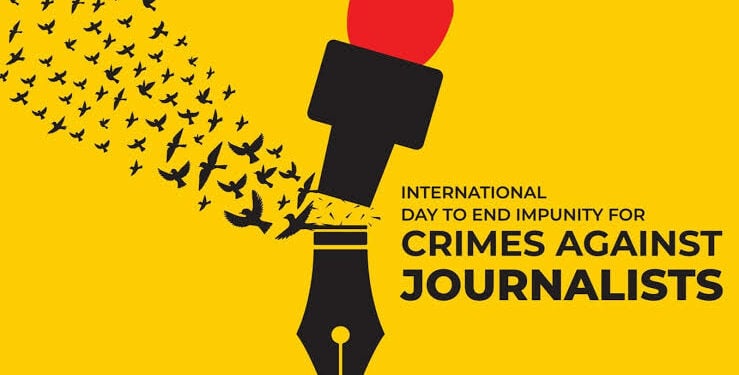As Nigeria joins the rest of the world to commemorate the International Day to End Impunity for Crimes Against Journalists, the people are reminded of the critical role of the press in the ongoing democratic effort.
Undeniably, the backbone of any democracy is an independent, professional, and responsible media that is a vehicle for free speech and informs, educates, and stimulates debate.
According to UNESCO, ending impunity for crimes against journalists is one of the most critical and complex challenges of recent times.
This newspaper is all too aware that many journalists and media professionals pay an unacceptably high price in the performance of their duty – enforced disappearance, torture, unlawful detention, and kidnapping, including death, for producing reliable and verifiable information.
This is even as stakeholders, including civil society organisations (CSOs) have called on President Bola Tinubu to address attacks on journalists in the country.
In what it called the second urgent appeal, the Centre for Journalism Innovation and Development (CJID), Citizens Gavel, and a coalition of 85 journalists, media practitioners, civil society organisations, and concerned Nigerian citizens in a statement, called for immediate action to end the persistent attacks and harassment of journalists and the media across the country.
While from 2017 onwards, UNESCO recorded gradual decreases in media workers killed in conflict zones, more recently, the trend has been reversed. The agency, during its monitoring in 2023, recorded that more than 50 per cent of journalist killings occurred in crisis- and conflict zones, with continuously high numbers in the first half of 2024.
Between 2006 and 2024, over 1,700 journalists were killed worldwide, with nearly nine out of 10 cases remaining judicially unresolved.
In Nigeria, the CJID’s Press Attack Tracker documented 51 verified press freedom violations nationwide. Disturbingly, in our view, it said 37 of those incidents occurred between January 1 and June 30, 2024, indicating a distressing escalation.
Since the first letter was sent, the CJID’s Press Attack Tracker has documented more than 90 confirmed cases of press attacks between July 1 and October 22, 2024.
On the other hand, the International Press IPC noted that it had recorded more than 40 attacks against Journalists in Nigeria in nine months this year, 2024.
UNESCO observed that threats of violence and attacks against journalists, in particular, create a climate of fear for media professionals, impeding the free circulation of information, opinions and ideas for all citizens.
Sadly, the ongoing wave of press freedom violations in the country, largely attributed to state actors, signals an alarming trend that endangers the safety of journalists and threatens the democratic principles of free speech and accountability.
This newspaper aligns with the views of the afore-mentioned stakeholders in their call on the federal government to implement laws and other measures directed at strengthening press freedom protection and ensuring that journalists and media professionals carry out their watchdog duties as guaranteed by the constitution without fear of attack and intimidation.
These functions include conducting thorough investigations into recent cases of journalists’ detention, and all reported cases of attacks on journalists and ensuring that the perpetrators are held accountable; engaging and pressuring all the arms of government to commit to respecting press freedom by upholding and protecting the rights of journalists as guaranteed by the Nigerian Constitution.
Similarly, the media is to engage the security agencies, particularly the Nigerian Police Force, the Nigerian Army, and the State Security Service (DSS), on their roles in protecting press freedom and the importance of properly implementing the laws that relate to press freedom and freedom of expression.
President Tinubu should direct those complaints against journalists in connection with their work be first reported to and investigated by the Nigerian Media Complaints Commission (NMCC), otherwise known as the National Ombudsman. If a prima facie case is established, the journalist concerned is invited, arrested, or prosecuted.
By protecting press freedom, we uphold the shared values of democracy and human rights. Journalists must be able to cover issues without fear of harassment, intimidation, or violence.
This is necessary to support good governance and ensure the public is fully informed.
The United Nations General Assembly proclaimed November 2 as the ‘International Day to End Impunity for Crimes against Journalists’ in General Assembly Resolution A/RES/68/163.
The resolution urged member states to implement measures countering the present culture of impunity. The date was chosen in commemoration of the assassination of two French journalists in Mali on 2 November 2013.
This year, the global commemoration of the International Day to End Impunity for Crimes against Journalists will take place on 6-7 November 2024 at the African Union Headquarters in Addis Ababa, Ethiopia, under the theme of Safety of Journalists in Crises and Emergencies.



